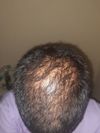community What 3 months of Top Min and 2 months Oral Fin do to a Man
The user experienced hair improvement after using topical minoxidil for 3 months, oral finasteride for 2 months, and additional treatments like derma rolling, Ketozolin shampoo, rosemary oil, and vitamin D supplements. They also lost 9kg during this period.
